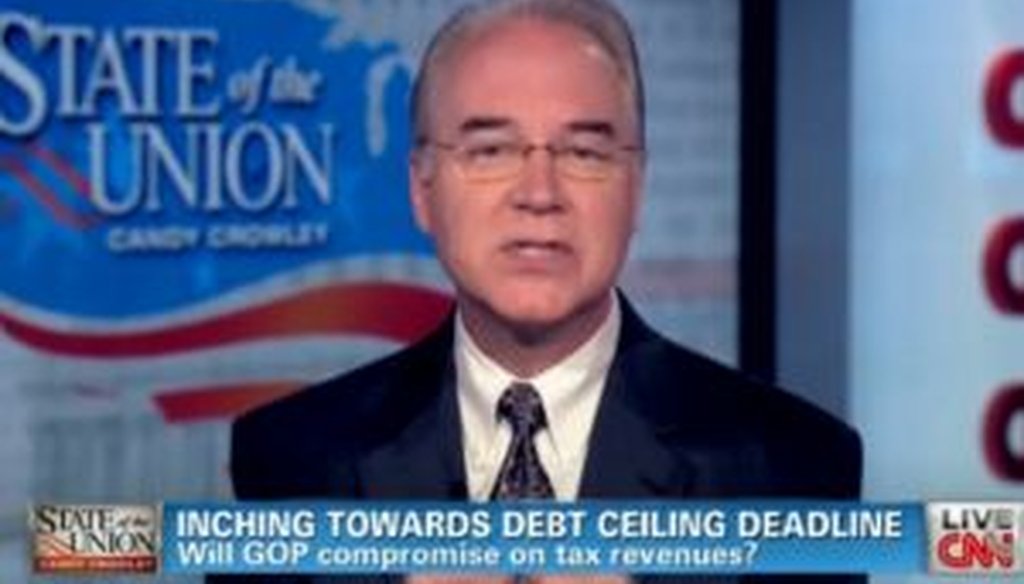Get PolitiFact in your inbox.

Rep. Tom Price, R-Ga., says the U.S. can avoid default if it simply uses incoming revenues to pay bondholders. But doing that could leave other federal creditors high and dry.
Georgia Republican Tom Price says paying debtholders first will stave off default
While some predict dire consequences if the federal government doesn’t end its stalemate over the debt ceiling, U.S. Rep. Tom Price, R-Ga., argues that the risk to the nation isn’t that great.
The nation won’t default on its debts, the Roswell Republican told Candy Crowley on CNN’s State of the Union on July 24, 2011 -- not even if Capitol Hill lawmakers fail to reach a deal to raise the limit before the Aug. 2 deadline.
The federal government still has plenty of money to pay bondholders, Price told Crowley.
"Well, the U.S. won't default, because default means that you don't pay your creditors," Price replied. "And it takes about 10 percent of the money that's coming in right now..."
If that's right, we wondered, then why all the hand-wringing?
First, some background. President Barack Obama and Congress have been engaged for months in intense negotiations discussions about raising the debt ceiling, which is the legal limit on how much money the government may borrow.
After hitting the debt ceiling earlier this year, the U.S. Treasury Department juggled accounts to buy time for further negotiations. Officials now expect the debt limit to be reached on Aug. 2, 2011. The negotiators have so far failed to come to agreement, with each party offering its own plan to end the crisis.
If the debt ceiling isn't raised by Aug. 2, the nation won’t have the money to cover all of its debts, the Obama administration has warned. But Price argues that a failure to pay the government’s bills does not in itself mean the government is in default.
What really matters, he argues, is that the U.S. pays the interest it owes on bonds. (There’s some disagreement about whether the government can prioritize its payments, but many experts think that if push came to shove, the U.S. government could choose which of its bills to pay first.)
And the nation has more than enough money -- even without a debt limit increase -- to pay this portion of its debt, Price says.
We’ve heard this argument before. U.S. Rep. Michelle Bachmann of Minnesota, a leading Republican presidential contender, said during a July 13, 2011 press conference that "it is simply not true" that "if Congress fails to raise the debt ceiling by $2.5 trillion, that somehow the United States will go into default, and we will lose the full faith and credit of the United States."
Price appears to be correct that cash inflows could cover bondholder obligations, at least for a while. The Bipartisan Policy Center -- a Washington, D.C.-based think tank with a board that includes former politicians from both parties -- conducted an analysis of what the government's fiscal situation would be if a deal on the debt ceiling is not reached.
When the center analyzed the government's inflows and outflows for the rest of August 2011, it found $172.4 billion in cash coming in, to offset required payments of $306.7 billion. That works out to a deficit of $134.3 billion.
With that amount of income to work with, the government -- if it could prioritize payments -- could pay the monthly costs of Medicare and Medicaid ($50 billion), Social Security ($49.2 billion), Pentagon vendors ($31.7 billion), interest on the debt ($29 billion) and unemployment benefits ($12.8 billion). Those categories total $172.7 billion.
But doing so would mean delaying other payments -- for instance, Pell grants and other educational programs ($20.2 billion), salaries and benefits for federal employees ($14.2 billion), welfare and food programs ($9.3 billion), health and human services grants ($8.1 billion), housing assistance ($6.7 billion) and many other programs, including military active duty pay ($2.9 billion), veterans affairs program ($2.9 billion), Department of Justice funding that includes the FBI and federal courts ($1.4 billion) and IRS refunds ($3.9 billion).
The assumption by Price and Bachmann is that the financial markets would be satisfied as long as the interest on bonds was paid, even if doing so meant delaying payments to any number of other creditors to the federal government, from Social Security beneficiaries to federal workers to Pentagon contractors.
However, as we noted in a previous article, independent experts don’t agree with his definition of "default," and they’re skeptical that investors or ratings agencies will just ignore a federal decision to pay certain creditors and not others and that U.S. creditworthiness would remain as sterling as it was before.
Lawrence J. White, an economist at New York University's Stern School of Business, said that "if the federal government delays payment to anyone, then certainly in a common-sense sense, the government has defaulted on its obligations."
Neil H. Buchanan, a George Washington University law professor who specializes in economics, agreed.
"If the government fails to pay any obligation on schedule, that is a default in both the common-sense meaning and in the legal sense," Buchanan said. "The person to whom money is owed has not been repaid. That's a default."
The same experts were also skeptical that simply paying bondholders would convince investors and ratings agencies to overlook late payments or non-payments to other federal creditors.
"I believe that the financial markets would not be copacetic" if bondholders were repaid but other creditors weren’t, White said. "They would realize that the government was stiffing one set of claimants who are creditors, and the markets would worry that they might be next."
Buchanan of GWU agreed with White’s point and added another.
"Foreign holders of (Treasury notes) will understand that it is politically untenable to pay foreigners but not Americans," he said. "Can you imagine the firestorm if Americans were told that we cannot afford to pay Social Security recipients, because we have to pay foreign banks and governments first? The argument that we must do so to protect our credit rating will sound an awful lot like ‘too big to fail’ -- the same argument that said that banks in 2008-09 had to be bailed out, while homeowners and unemployed workers were thrown to the wolves. No matter how strong the argument that doing so is necessary to protect our credit rating, the bottom line is that the government would be favoring foreigners over Americans. Any foreign investor would know that this is not politically sustainable. They would have every reason to dump our bonds, or at least to require much higher rates of return."
In a June 3, 2011, report, the Congressional Research Service -- a nonpartisan research arm of Congress -- agreed with many of these points.
"The full faith and credit of the U.S. government would be threatened," the CRS wrote. "Domestic money markets, in which government securities play a major role, could be affected substantially. ... If the government fails to make timely payments to individuals, service providers, and other organizations, these persons and entities would … be affected. Even if the government continued paying interest, it is not clear whether creditors would retain or lose faith in the government’s willingness to pay its obligations. If creditors lost this confidence, the federal government’s interest costs would likely increase substantially and there would likely be broader disruptions to financial markets."
And on July 13 and 14, two major ratings agencies -- Moody’s and Standard & Poors -- publicly announced that they were watching carefully. The agencies said they were reassessing whether U.S. Treasury Bonds merited the top credit rating. These ratings, issued by agencies that are independent of the government, provide guidance to investors about how secure bond investments are.
Featured Fact-check
"It is very difficult to make lots of individual decisions about whom to pay," said Barry Bosworth, an economist with the centrist-to-liberal Brookings Institution. "I think (Price's) statement is false in the sense of implying it is not a significant problem," though he added that the Obama administration "is also creating a false sense of disaster when it implies that everything will stop on Aug 2. Financial markets are still having trouble believing that America has sunk to such a point of government dysfunction, and there is yet to be much of a reaction. Thus, the effects are likely to build more gradually."
So where does this leave us? We’ll concede that we’re in relatively uncharted territory. However, independent experts suggest that simply paying debt holders while letting other federal creditors go unpaid won’t keep the U.S. from "default" -- either the technical or the common-sense variety. In addition, both academic experts and the Congressional Research Service agree that only paying debt holders won’t be enough to keep U.S. creditworthiness unblemished. Price downplays the real risks of default and creditworthiness in a prioritization strategy that pays debt holders at the expense of other federal credit holders. So we rate his statement False.
Our Sources
Tom Price, interview on CNN’s State of the Union, July 24, 2011
Congressional Research Service, "Reaching the Debt Limit: Background and Potential Effects on Government Operations," June 3, 2011
Bipartisan Policy Center, Debt Ceiling Analysis, June 28, 2011
PolitiFact, "Barack Obama said Social Security and other federal checks may not go out on Aug. 3 if the debt ceiling is not increased," July 13, 2011
PolitiFact, "How bad would default be for U.S. creditworthiness?" July 16, 2011
Standard & Poors, "Research Update: United States of America 'AAA/A-1+' Ratings Placed On CreditWatch Negative On Rising Risk Of Policy Stalemate," July 14, 2011
CNNMoney.com,"Debt ceiling: Moody's puts U.S. on notice," July 13, 2011
Washington Post, "Debt limit: U.S. outreach to banks, investors over possible default comes up empty," July 14, 2011
Washington Post, "S&P warns that chance of downgrading U.S. credit rating is 50 percent," July 14, 2011
Wall Street Journal, "Plan B Emerges on Debt," July 15, 2011
E-mail interview with Barry Bosworth, senior fellow with the Brookings Institution, July 26, 2011
E-mail interview with Neil H. Buchanan, George Washington University law professor, July 14, 2011
E-mail interview with Lawrence J. White, economist at New York University's Stern School of Business, July 15, 2011
E-mail interview, Ryan Murphy, spokesman, U.S. Rep. Tom Price, July 26, 2011
Browse the Truth-O-Meter
More by Louis Jacobson
Georgia Republican Tom Price says paying debtholders first will stave off default
Support independent fact-checking.
Become a member!
In a world of wild talk and fake news, help us stand up for the facts.














































